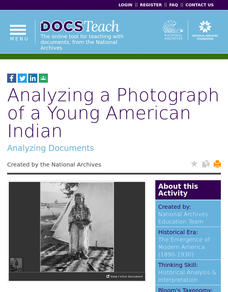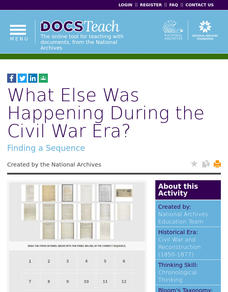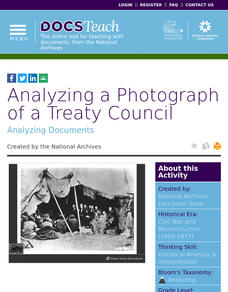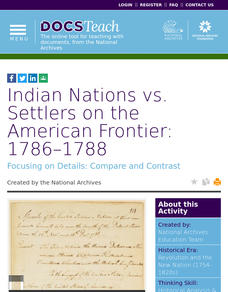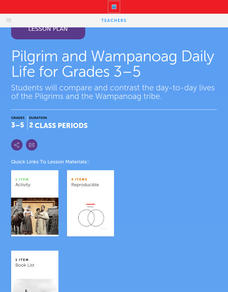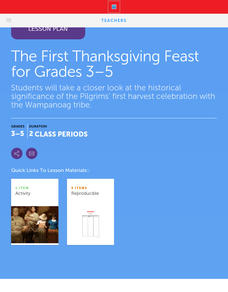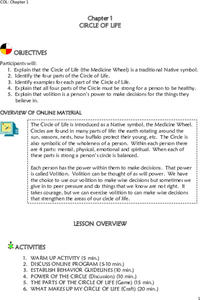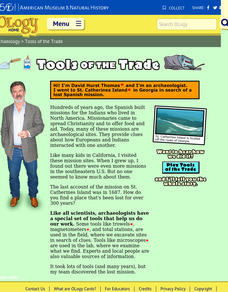DocsTeach
Before and After Carlisle School
White reformers thought they were "killing the Indian" to "save the man." Native children were taken from their parents and placed at boarding schools, such as the Carlisle School. Using a comparative photo analysis of children before...
DocsTeach
Assimilation of American Indians
Imagine being forced to give up your culture and then being graded on how well you complied with orders to do so. Documents show young historians the price indigenous peoples paid as a result of the Dawes Act, which was essentially a...
DocsTeach
Analyzing a Photograph of a Young American Indian
A true glimpse of the past, Angelic La Moose smiles back from more than 100 years ago. Young learners examine the picture of a young girl on a Montana Native American reservation from 1913 to comb it for historical details. A form, which...
National Woman's History Museum
Red Power Prevails : The Activism, Spirit, and Resistance of Native American Women
Native American women powered the American Indian Movement and other social changes, but they are often forgotten by history books. Examining a series of resources, including a documentary film, photographs, secondary sources, and social...
Digital Public Library of America
Women in the Civil War
Vivandieres and cantinieres, nurses and soldiers, loyalists and unionists. A primary source set provides young historians an opportunity to investigate the many roles women played in the United States Civil War.
DocsTeach
The Impact of Westward Expansion on Native American Communities
Although Westward Expansion is often romanticized, its impact was devastating on Native American communities. Primary source documents, including pictures of United States troops invading indigenous lands and Native American tribes, tell...
DocsTeach
What Else Was Happening During the Civil War Era?
Examine a time of political division and upheaval— not unlike our own—using firsthand accounts. While study of the Civil War often takes center stage in the classroom, the 1850s and 1860s were a period of profound change in other areas...
DocsTeach
Evaluating Perspectives on Westward Expansion
Although popular culture tells the story of the American West simplistically, its reality is far more complex. Native American tribes—while already on the land—didn't have the same interests, and conflicts between white settlers and...
DocsTeach
Analyzing a Photograph of a Treaty Council
A photo catches a moment in time that provides a glimpse into the past. An interesting resource focuses on historical analysis using an image from a treaty council with Native Americans. Budding historians complete an online worksheet...
DocsTeach
Lewis and Clark's Expedition to the Complex West
Lewis and Clark's famous expedition is a prime example of the United States' westward expansion. Aspiring historians examine maps from Lewis and Clark's journey, as well as discuss their interactions with Native American tribes. The...
DocsTeach
Indian Nations vs. Settlers on the American Frontier: 1786–1788
Once Americans won the Revolutionary War, their quest to gain land did not end. An interesting activity focuses on Americans' expansion into the frontier following the war and how it conflicted with Native Americans living in the area....
National Endowment for the Humanities
Hopi Place Names
What's in a name? Historians consider the question as they examine places important to the Hopi people and the meanings of their place names. Included worksheets include maps and charts to help class members examine the geography of Hopi...
National Endowment for the Humanities
Hopi Poetry
The Hopi refer to corn as their children, demonstrating its importance to the Native American group. Class members consider the role of literal and figurative language by examining poetry from this indigenous group. The resource includes...
Scholastic
The First Thanksgiving Feast for Grades 6–8
It's time for the feast! Young historians complete their study of the First Thanksgiving by completing an online activity, watching a slideshow, and examining a First Thanksgiving timeline. After answering text-dependent questions to...
Scholastic
Pilgrim and Wampanoag Daily Life for Grades 3-5
Thirteen steps make up a lesson plan that challenges pupils to compare and contrast the daily lives of Pilgrims and the Wampanoag tribe. Learners revisit the Graffiti Wall then break into small groups for an investigative reading...
Scholastic
The First Thanksgiving Feast for Grades 3-5
Scholars examine the first Thanksgiving through books and interviews while they complete a KWL chart. Pretending they are part of the feast, learners craft a scrapbook page that features images related to their experience. Pupils reflect...
Scholastic
Pilgrim and Wampanoag Daily Life
A lesson looks at the Pilgrims and Wampanoag tribe during the first Thanksgiving. Scholars compare and contrast information presented by an online activity then discuss their findings. Learners examine the two group's daily routines and...
Teaching Tolerance
Thanksgiving Mourning
Two primary sources, a speech, and an article provide tweens and teens with different perspectives of the American Thanksgiving holiday. After analyzing Wamsutta James' suppressed speech and Jacqueline Keeler's article, class members use...
Teaching Tolerance
Why Do We (Still) Celebrate Columbus Day?
What are we really celebrating on Columbus Day? The resource explores the narrative behind Columbus Day and ways for people to change the perception. Scholars also review vocabulary terms associated with the topic and how attitudes have...
Healthy Native Youth
Chapter 1: Circle of Life
Volition, or will-power, is the focus of a lesson that brings forth the Native symbol, the Circle of Life, to instill the importance of responsible decision-making. Scholars take part in six activities that empower them to reflect on...
American Museum of Natural History
Tools of the Trade
Archaeologist David Hurst Thomas details his search for a lost Spanish Mission on St. Catherines Island, Georgia. A great way to introduce youngsters to the life of and the tools used by archaeologists.
Osage County Interlocal Cooperative
Flight: 100 Years of Aviation
A 12-lesson unit traces the development of aviation from the Wright brothers flight at Kitty Hawk to Amelia Earhart's around the world journey, to Mercury 13.
Stanford University
Carlisle Indian Industrial School
How do policies aimed to help actually hurt? Native American boarding schools—an attempt at assimilating children of indigenous tribes into white culture—had a shattering effect on those who attended. With primary sources, including...
Stanford University
Native American Rights
It's time for scholars to put their knowledge of primary sources to the test. A helpful assessment uses photos to test pupils' knowledge of how to analyze primary sources and determine their time periods. High school social...




